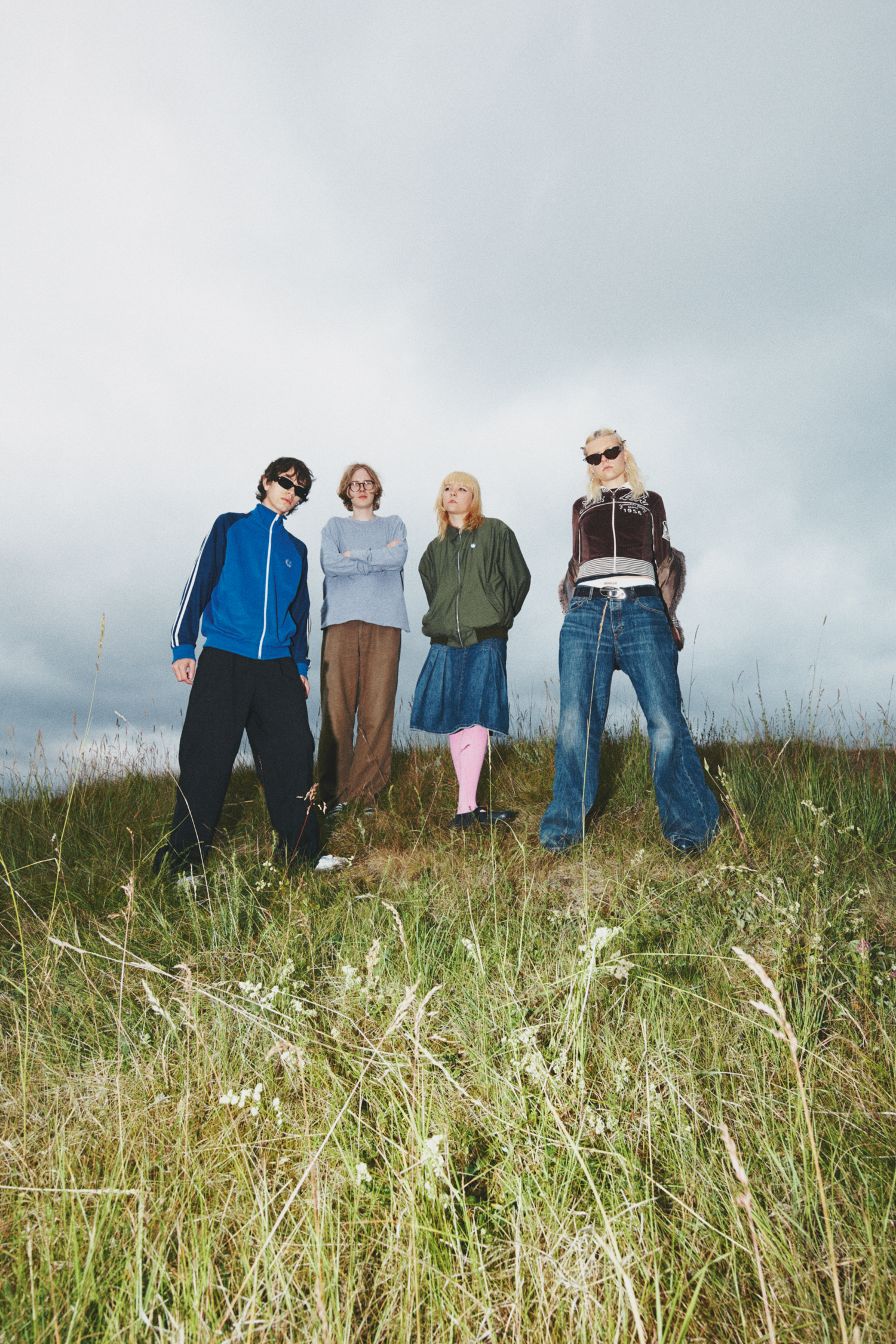Supported by Marshall
Clutter is the kind of band name that makes you smirk. Of course they’re called that. They’re four friends from high school that started out by making messy music in a teenage bedroom – what else??
When we meet over Zoom, chaos is part of the Stockholm-based band’s charm. Emma French is apologetically hungover, recovering from a graduation party the night before that stretched longer than expected. Ville Scott’s family chatters in the background after he joins in a little late. Ove Jerndal is calling in from London. Hilda Ander is calm and focused, grounding the group’s scattered energy without dimming it.
When I was first asked to conduct this interview, I was admittedly a little concerned. Any time I seem to know what I’m talking about musically – that’s improvised performance art. That said, I can wholeheartedly say that you don’t need to know a thing about music to enjoy Clutter. The song Geeks makes me lowkey headbang. Kraut would’ve completed my high school commute playlist in 2017 Stockholm.
To me, Clutter is one big cinematic madeleine cookie. They manage to capture a nostalgic feeling through both sound and visuals that are reminiscent of the late 90s and early aughts. Perhaps that’s why it evokes a high school association, the turn of the millennium being overrepresented in the teen romcom genre. There’s also the fact that some of the songs were written by literal high schoolers.
I ask the punk-adjacent band a redacted number of times, and in various iterations, what the genre means in 2025. It’s because I genuinely don’t know, but really want to. What rules remain unbroken? Have we burned through all modes of rebellion? Is anything considered taboo anymore?
Here goes.
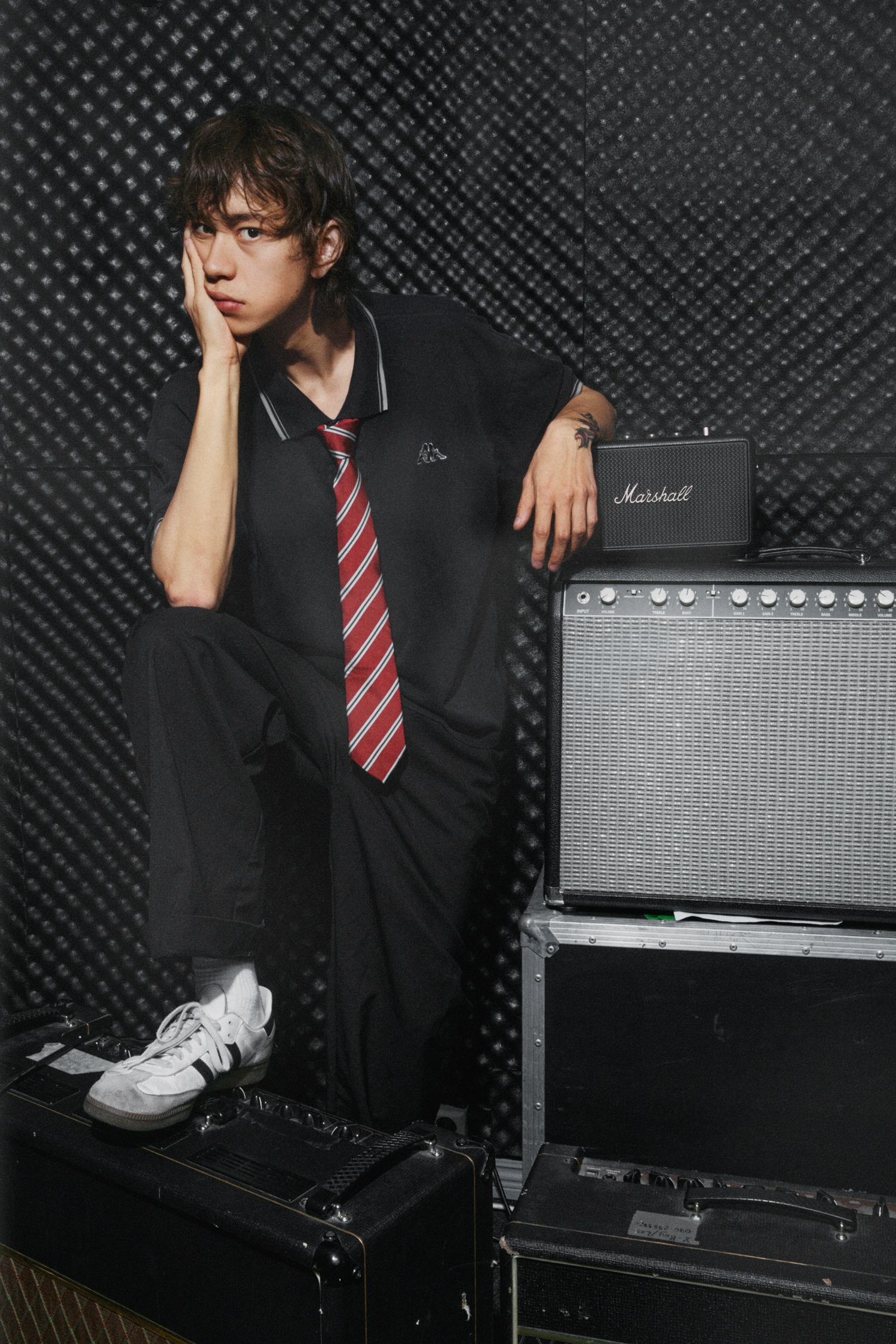
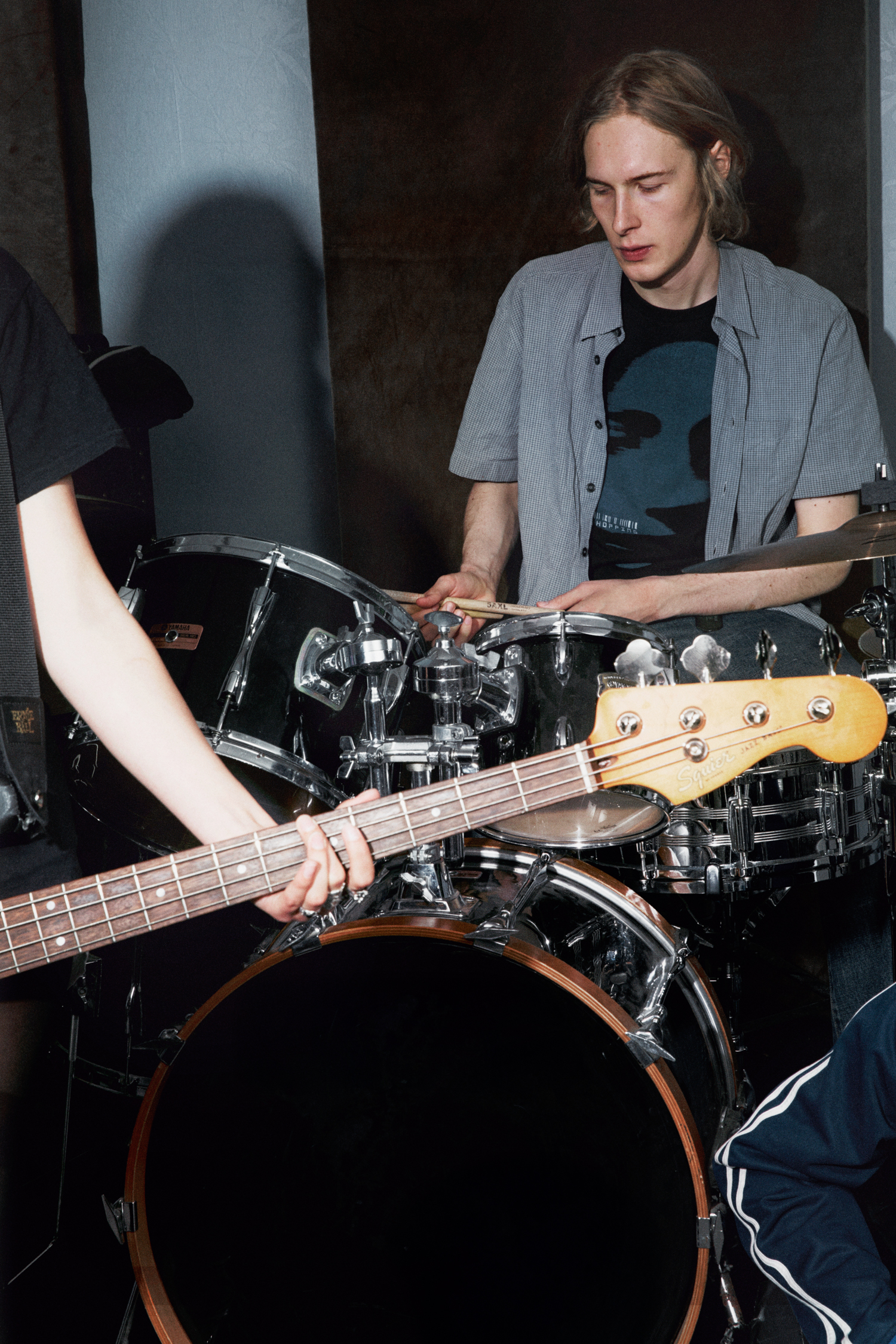
Hannah: Alright, how is everyone doing?
Hilda: Great, I’m at my dad’s. He’s cooking for me, so I’m very content.
Hannah: Lucky you, what’s he making?
Hilda: He was at some graduation party and brought some sort of leftover rice with him.
Emma: I am very, very, very tired because my sister had a graduation party with her entire class here last night. I had planned on going to sleep early because I had work this morning, but I ended up sitting around with them until 3AM smoking cigs. I was sort of like, fuck it, I won’t be able to sleep either way.
Hannah: Thanks for being here despite the exhaustion. Ove, how are you?
Ove: I’m also good, my family is visiting me this week in London. It’s been cozy. But I’m coming home to Stockholm next week, which I look forward to.
Hannah: I just wanted to start by congratulating you on your debut EP, Loves You. I loves it. How are you feeling now that it’s out in the world?
Hilda: It feels great, a bit of a relief. We worked on it for a long time, and now we finally can start working on the next thing.
Ove: We’re kind of eager to start on something new already.
Hannah: You’ve been working on it since like 2022, right?
Ove: Yeah, something like that. Some of the songs are really old, and some are more recent. It’s a project we’ve been working on sporadically for years. Certain periods we’ve been focusing on it intensely and others we haven’t been so productive.
Hannah: Right.
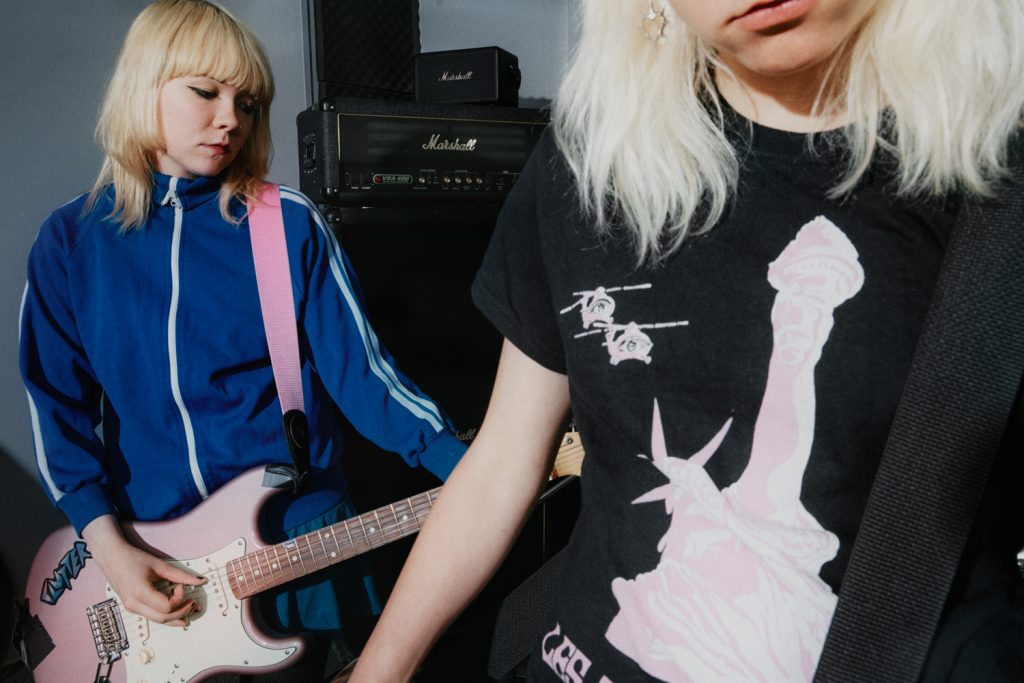
Ove: But it feels great that it’s out there. I guess it’s only been two months since we released it, but it feels like it was like three years ago.
Hannah: What is it that makes it feel like it was so long ago?
Ove: I sorta think that it’s exactly because some of the songs are so old.
Hilda: It’s been a long process overall, the songs were released one month apart. Jesus was released last fall. A lot of the songs were recorded ages ago, and I’ve listened to them on my secret Ove-link about a million times.
Hannah: So, you’re sick of your own music?
Hilda: I am sort of shocked at how good I think it is every time I listen to it. It makes me so happy, but I am also ready for us to work on new things.
Hannah: That’s incredible! Utterly amazing, congrats! I am so curious about how you guys met. How did Clutter come to be? Three out of four of you attended the same high school, right?
Hilda: Yes, Emma and Ove need to tell the story.
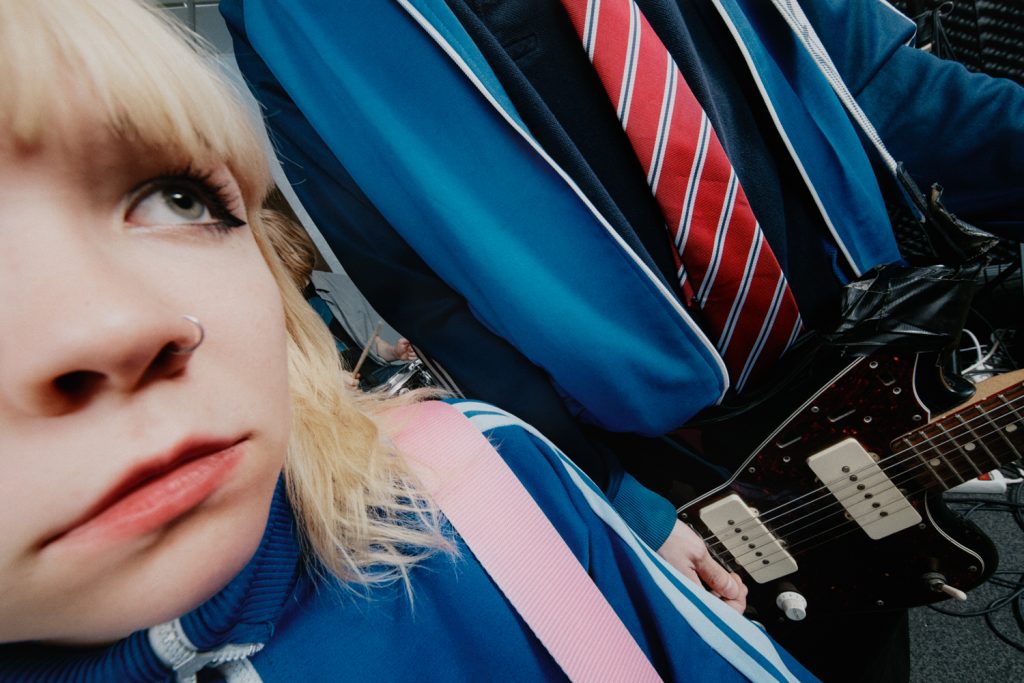
Ove: Yes, the three of us started the same year, 2020.
Hannah: 2020. Damn.
Ove: Yup. We had all applied to be guitar majors. Emma and I started in the same class and it didn’t take long before we had zeroed in on each other. We saw Hilda the first day and thought “she needs to be our friend.”
Emma: I was looking around the classroom, saw Ove, and thought oh my god, this guy is the only person I am going to be friends with. And then we became friends and he was like, let’s start a band. And now we’re here.
Ove: After writing our first few songs and booking our first gig we desperately needed a drummer. Ville and I had been playing in bands together since we were like 13, and we called him a few days ahead of our first show and were like, “we know you haven’t even rehearsed these songs but would you play with us?”
Speaking of the devil, Ville hops on the call. He’s mouthing at the camera.
Hannah: I can’t hear you Ville, I think your mic is off.
Ville mouths something like “oh shit”. The mic turns on.
Ville: I’m so sorry I’m late, I have family visiting.
It’s the week before Midsummer, one of two occasions a year when Swedes travel distances to merge with extended family members. It’s a busy time – both socially and professionally. Swedes are finishing up work before going on their 5-week long summer vacations, a time of year that drives international business partners and collaborators up the walls. It’s also graduation season, and all over Stockholm you can see people scurrying from one party to the next.
Hannah: Oop, I know what that’s like. How are you?
Ville: I’m doing great.
Hannah: I wanted to ask about your UK tour. Crazy stuff, working with Hinds. Did you have a good time?
I had no idea who Hinds were before prepping for this interview, but after looking them up on Instagram I saw that they have 143K and are followed by @perfectlyimperfect so I guess they’re cool. Anyway, they’re a Spanish indie rock duo and it turns out they have some undeniably catchy stuff.
Ville: It was great. From what I can remember. I was pretty nervous before though. We hadn’t really performed without Ove before, and he could only make the first and the last shows of the tour. I was worried it wasn’t going to feel 100% like Clutter. But everything worked out so well that I quickly stopped worrying. Each show was a bit of a roller coaster, and Birmingham was perhaps not the most lively city in the world, but it was still amazing. Maybe I’m wearing rose-tinted glasses.
Hilda: I don’t think you are. Preparing for the tour was a bit crazy because it was on such short notice. Everyone already had things going on. I was quite anxious about the trip, but we got so much help with the planning. They booked us hotels, it was so professional.
Ove: Everyone on tour was amazing. Hinds were machines.
Hannah: What did it feel like to be asked to open for them? Where were you when you got the news?
Hilda: At first they were like, “We’re not promising anything, but this might be happening…” And we were like, “You can’t just say that to us! You can’t almost give us something and then maybe take it back.”

Emma: I think we all freaked out a little.
Ville: My first thought was, “I need to check my calendar.”
Ove: It was confirmed two or three weeks before the tour started. I knew the logistics would be hard for me. It was a bit stressful, honestly. But we just kept telling ourselves, “This is going to be fun, this is going to be great. We’re doing this.” And it was great.
Apart from Clutter, Ove is also one half of the punk-adjacent duo Lover’s Skit, which has kept him busy throughout the spring.
Hannah: Do you have any fun anecdotes from the tour? Any extra memorable nights? A good afterparty?
Hilda: It was honestly just so freezing. When we stayed with our tour manager in Sheffield, Emma, Ville, and I slept on the same air mattress under the same blanket. A good anecdote is that we shoved about 100 t-shirts into a snare drum which we transported from Sweden.
Ville: For those who want it enough it might be good to know that it is possible to fit 100 t-shirts in a snare drum.
Hannah: Holy shit, impressed. It feels like there must be a huge difference between a Swedish and UK audience. I’m thinking in terms of rowdiness. Am I being biased?
Hilda: It’s kind of hard to compare. When we play in Stockholm we know a lot of people in the audience. Like when we played at Snövit. I invited everyone I had ever met. It’s a completely different thing to stand in front of a crowd of people you don’t know in a city you’ve never been to before and where the only thing you have time to see is the venue.
Hannah: Does knowing people in the audience make you more or less nervous?
Ove: I think it’s way more nerve-wracking to play in Stockholm. It’s almost stressful.
Ville: I feel the opposite. In Stockholm, there are always a few people we know will always show up. It’s guaranteed they’ll be there. You can tell by looking at them that they like the music and the show. They’re usually the ones standing right up front.
Emma: It’s kind of nice to have someone to focus on. When we played in the Netherlands, there were tons of other cool young bands playing the same festival. I was super nervous then. I wanted to impress them, but also the crowd. It was a weird gig because it was a business festival. A bunch of business people were just standing there totally silent, looking really grumpy.
Hannah: Why were there a bunch of business people?
Hilda: What do you call that kind of festival, Ove?
Ove: I think it was one of those showcase festivals. So it was mainly people from the music industry. You end up doing quite a few of those kinds of gigs as an up-and-coming band. Where you go to London or something and play for a small invited audience. That’s maybe what’s different about playing in Stockholm – then it’s a real audience. And that’s great in its own way.
Hilda: It’s hard to play your best when everyone’s just standing there looking kind of bored.
Hannah: No kidding. A good audience really helps with your own presence, I’m sure. Has anyone ever shouted something at a gig that was so attention-grabbing that it threw you off guard or made you lose focus?
Ove: Most bands have been booed at some point, but I don’t think that’s happened to us. Yet.
Hannah: Good for you. Or do you think it’s a kind of backwards quality marker to be booed? A rite of passage? Is it something you’re looking forward to?
Ville: It’s not really something you look forward to. But you don’t want to be a band that everyone likes a little. You want to be a band that a few people really love.
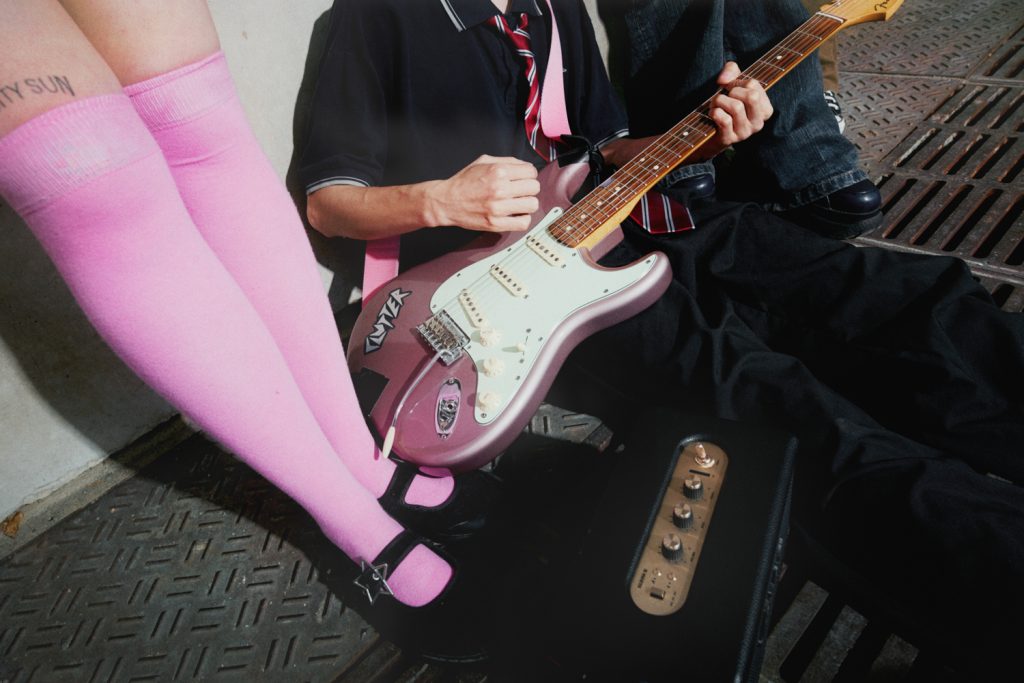
Hannah: Did the tour change how you see yourselves as a band?
Ove: Our playing improved so much just from going out on the road. Confidence too, and maybe even sense of purpose. That it’s actually possible to go on tour, and to do it really damn well.
Hilda: It was reassuring to know that one possesses the ability to sleep in so many different places in such a short time, being away from your comfort zone. And also that no matter how you’re feeling, you can still put on a good gig. When we sent our songs to PNKSLM, we were kind of like… maybe we should stop playing, we didn’t know what direction we were headed in. But once we decided to sign, it was like suddenly we had a goal. I feel like the tour gave off the same vibe – like, I just want to keep doing this.
Hannah: I think an ungodly amount about irony and sincerity. The topic has definitely been present in culture at large in the past few years. About a year ago there was that whole “ironic poetry” debate in Swedish newspapers. It seems to me that you guys are quite earnest in your music. From your aesthetic to the lyrics. Do you think that sincerity is punk today?
Ville: I think it can go either way. I like irony, but only when there’s something serious lying beneath. I find it frustrating when everything has to be drenched in irony. To me that comes off as being insecure about expressing yourself.
Emma: I think irony can be very honest. But I’m not sure we’ve thought so much about honesty. I think we just sort of are earnest, both individually and as a group.
Ove: We come from a pretty ironic cultural background, I would say. We love the 90s and a lot of the music from that time. I think Clutter has an ironic layer, and I think certain songs are more sincere than others. But we’re all coming at it from an authentic place.
Emma: My cap is kinda ironic.
Emma gestures to her cap, adorned with the Union Jack. Very trad punk.
Emma: I think the main thing is that we are careful not to compromise our authenticity. Like, even if I want to look cool on stage, I still want to be myself.
Hannah: I’m asking about it because I feel like there’s an interesting connection between sincerity and punk. It seems like the cool, punk thing for so many years was to be ambiguous in what you’re saying. To me the rebellious thing to do today would be to be sincere. What do you think is punk today?
Ville: Punk is dead, man.
Ove: I think I agree with Ville. Punk in the sense that it’s a way of thinking and being will never die, but punk as a subculture is dead and it died 40 years ago.
Ville: There are no subcultures anymore. Things are too fragmented and too drenched in irony to take on a concrete form.
Hannah: The internet definitely plays a role there.
Ville: The internet has made it so that everyone can get their cultural needs met by an algorithm. Or maybe 90% of your cultural needs. Punk was born from a bunch of kids that felt like outsiders and who managed to find each other. Kids don’t need to interact with each other in real life anymore. They see photos of each other and think “we’re just like each other” and that’s enough somehow.
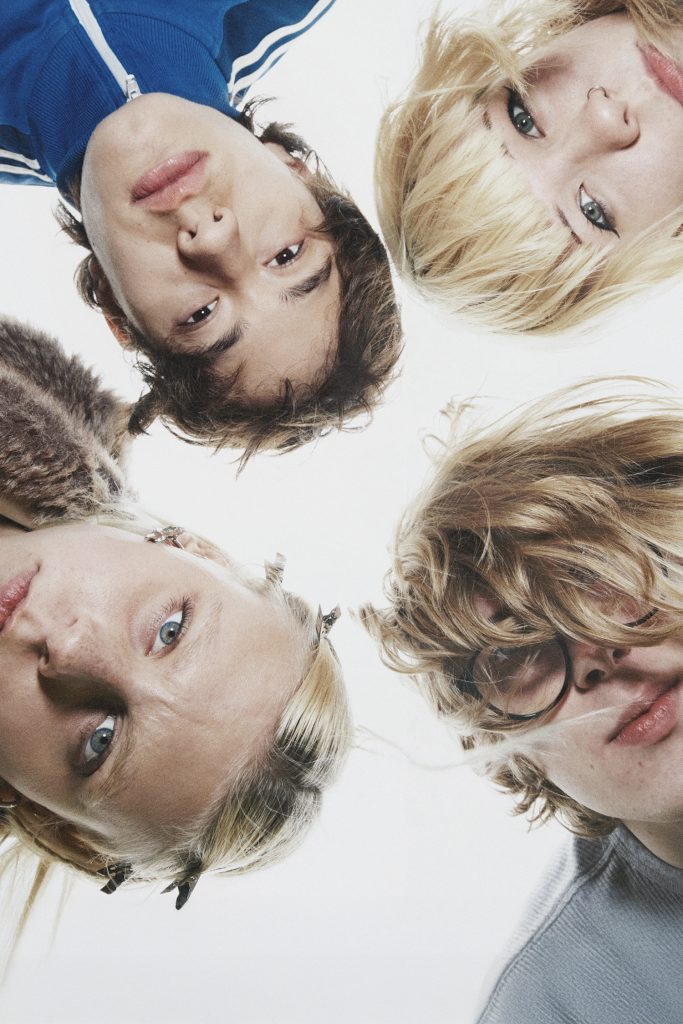
Hannah: That’s when a subculture is watered down to something that has to do primarily with aesthetics rather than culture. I’ve been living in the US for the past three years, but from afar it feels like Stockholm has been getting more and more exciting. Suddenly there’s all these events. Concerts, readings, things that are more DIY in nature. Do you agree?
Emma: I agree, there’s a really rich cultural life happening in Stockholm. There’s been like three events a week that I want to/have to/should attend. I don’t want to miss anything, and that’s great.
Hannah: Do you ever get fomo if you decide to stay in one night?
Emma: All the time. That’s why I’m so stressed out.
She laughs. I laugh in agreement.
Emma: But I’d rather there’s too much going on than not enough.
Ove: I’ve been away from Stockholm for the past six months and it feels as if they have been the best months since the end of the pandemic. It seems about right that it would take five years for the culture to recover. When the pandemic ended our generation graduated and claimed the city.
Emma: Everyone is also so sweet toward one another. People go to each other’s events and show so much appreciation and enthusiasm.
Hannah: I read that Loves You was born during a time you considered quitting music. Tell me more about that time and why you decided to keep going.
Hilda: It was right around the time we were about to start our third year of high school. Music didn’t really seem like a super reliable way to build a future or make money. Everyone was kind of thinking about which path to go down. I wanted to give poetry a try. I ended up attending a writing program, just because that’s what all our friends were doing.
We decided to record the songs regardless. It was actually Ove’s idea to send the songs around to labels, just to see what might happen. It was so exciting to get positive feedback from people.
Hannah: Were you surprised that labels were reaching back out? When I was in high school, there still felt like a huge gap between myself and “adults”. Like, “They’re not going to take me seriously. I’m just a kid.” I think I still feel that way, even though my prefrontal is literally fully developed. Were you surprised that people showed interest?
Hilda: I was definitely really surprised.
Emma: I didn’t really think much about the age thing. But I was surprised that they actually liked the music and took it seriously. We literally just sent around a link. I don’t even know if they checked who we were. They just said, “We like your music.” And that was surprising.
Hilda: Like, we thought it would forever just be our families and friends saying, “Yeah, we like your music.”
Ove: Maybe we were a bit unsure of ourselves at times?
Ville: Looking back it feels like such a classic moment, right around the time you’re graduating high school, thinking: “We have to stop the band. We’ll never have any time for it ever again. We just have to kill it.”
Ove: I think just going through the process of getting together, writing five songs, recording them, thinking and talking about them – that process alone gave us so much adrenaline and energy. Just to see something in front of you that actually felt like something.
Hannah: Love it. There’s a feminist spirit in your music. You’ve mentioned before that Kathleen Hanna is an inspiration.
Emma: I just read her autobiography. It’s wild how much I could relate. I feel very insecure. Just holding a guitar is hard. Being brave enough to do that, and then feeling like you actually have the right to be there — that’s important to me. You don’t have to be Kathleen Hanna. You don’t have to write “Rebel Girl.”
Hannah: What’s something each of you contributes to the band that isn’t musical? Is someone the go-to for snacks? Snus? Fun facts? Chaotic energy?
Ville: Hilda always takes care of everything. You’re super on top of things.
We can indeed confirm this. We’ve been emailing with Hilda for the past week to make this interview and shoot happen.
Hilda: That’s nice to hear.
Emma: I just think about how every time we rehearse, we always take a lunch break at 7-Eleven. It’s about grabbing those 7-Eleven snacks. We spend a lot of time at 7-Eleven.
Hannah: That place is amazing. Has anyone ever had their one-liter coffee?
Hilda: No, but I did buy hot water in a coffee cup that size once. I brought instant noodles and made them in the takeaway cup instead of coffee.
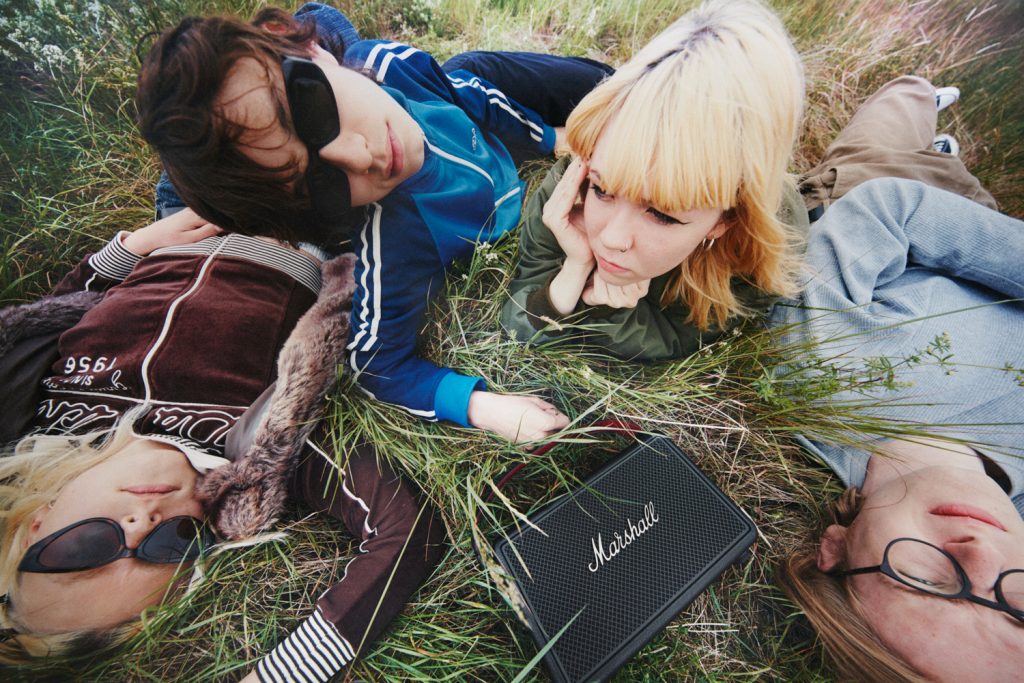
Hannah: I love Swedish 7-Eleven. It’s the best thing we have. American 7-Elevens are absolutely disgusting. The vibe is just off. But Swedish 7-Eleven? It’s basically a mid-luxury coffee shop. So fresh. So clean. So cozy.
Hilda: Did we actually answer the question? I don’t think we did. I brought a bottle of Cava when we’d just released Holy Brother. I also brought fortune cookies.
Emma: But there’s not really a routine.
Hannah: Tell me about one of your most fun gigs.
Emma: I think right now I’d say Echo Three Fest. Maybe not the most fun of all time, but out of the recent gigs. I was really happy after that one.
Hannah: Why that one?
Emma: I don’t know. Playing at Slaktkyrkan was a big deal. Ove was in Sweden.
Hilda: We had a backdrop. That felt huge. There were lights flashing behind us.
Hannah: That is huge.
Ove: I actually really liked our first gig in London, even if it was a bit chaotic. The show itself wasn’t really the focus of that trip. But it was the first time we all went somewhere together. So much fun, I barely even remember the actual gig.
Hilda: Yeah, true. The actual show was kind of awful.
Ove: Probably, yeah. I just remember the trip and the fun.
Hilda: That was probably the most fun we’ve had. And at the time, it felt huge. I was fully in it.
Hannah: Do you have any pre-show rituals?
Hilda: We’ve tried to create some. But we’re really bad at it.
Ove: I’ve started stretching my wrists before the show. I put my palms together. It kind of looks like I’m praying.
Ville: I kind of go into autopilot mode for an hour or two before the show. So I guess my prep happens without me really noticing, like tapping on stuff. Then suddenly it’s two minutes until stage time and I’m like, “Alright, let’s go.”
Hilda: I feel like I always gargle a lot of water. I don’t think it helps at all. I just need something to do.
Hannah: Is there a famous pre-show ritual you’d want to make your own?
Ove: I don’t know… maybe arrive in a helicopter?
Emma: Oh! Can I tell this one? Ville and I saw The Hives at Gröna Lund, and backstage they were hyping each other up by hitting each other. Or am I making that up?
I googled this after the interview. The Hives do, in fact, have a pre-show ritual of slapping each other.
Ville: They were drumming on each other’s backs.
Emma: I don’t know. It was years ago, and I was just like, “Oh my god, it’s The Hives and we’re backstage.” And then they started hitting each other and went on stage. It was the best show ever. We don’t hit each other. I don’t want to steal that ritual, but it was a memorable moment.
Hannah: Yeah, that’s fascinating. What is bad music?
Ove: Bad music? Turnstile.
I had to google Turnstile post-interview.
Ville: Woah!
Ove: They suck.
Ville: No, but seriously, any music that’s created for reasons other than a genuine creative drive… it’s not worth a cent.
Emma: I’m not sure I agree.
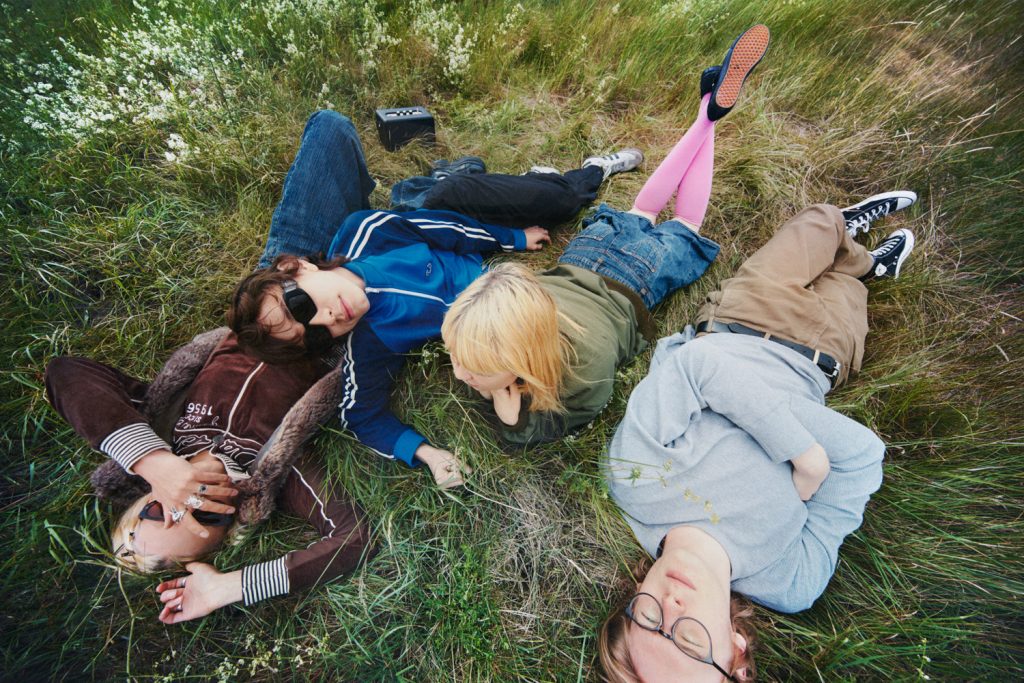
Ville: I mean, I guess. Like, Max Martin writes hits not because he’s creatively driven, but because they’re meant to be hits. And you can’t deny that there are good Max Martin songs.
Ove: I don’t really have a pattern in what I think is good or bad.
Hannah: No pattern, just a gut feeling, a visceral reaction when you hear something?
Ove: I think so. But often it’s not the music itself that makes me like or dislike it.
Hannah: Ooo, exciting. What makes you like/dislike the music you listen to?
Ove: A bit of everything. It could be as simple as having a bad day when you’re listening to a certain song. For me, clothes matter. It’s like Ville said, the artist has to have a creative purpose. On the other hand, I always think it’s worthwhile to make music, whether it’s good or bad.
Hannah: I agree. Making bad art is also important.
Ove: Yeah. I’ve always been more drawn to artists, and the mythology behind them.
Hannah: The persona-building.
Ove: Exactly. I love nerding out on bands and artists. That’s what carries the music.
Hannah: Yeah, it’s hard to separate the music from the myth. I totally get that. That self-mythologizing is powerful – it shapes why we read certain authors or listen to certain artists. It just makes the whole thing richer.
Hilda: I also think for music specifically it’s harder to separate the person from the art than, say, literature. A book is just words and a name, sometimes not even the real name. But with music… you’re an artist. It’s way more than just the music you release.
Hannah: It’s more public-facing. The creator is more bound to the creation. Harder to separate the two, even if you want to.
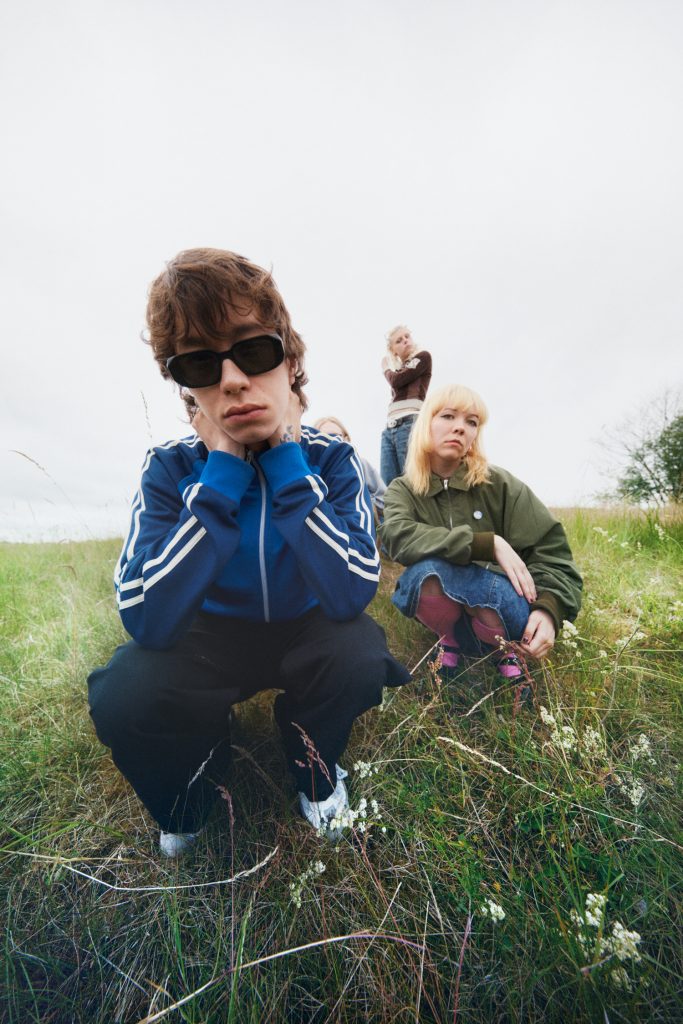
Ove: You don’t have to separate the two, but I think we all want to live up to what we make. It almost feels like we have the responsibility to do so.
Hannah: Have you thought about balancing persona-building with authenticity?
Hilda: I’d say we’re still 100% ourselves. It’s just that there are so many sides to a person, and maybe I don’t show all of them at the same time on stage – that would be impossible. Primarily just because you simply can’t show that much of yourself all at once. So it’s more that we’re all being ourselves, just that we’re only making parts of ourselves publicly known.
Hannah: Let’s see if there’s anything else I wanted to ask… I’m someone who’s not super into music – mostly a writer – but do you think there’s such a thing as a “Swedish sound”?
Ville: Maybe. It’s hard to tell whether something is a sound or a trend. I’m speaking specifically about what’s happening in Stockholm. But I do think there are certain elements that have emerged in several acts. I find it hard to put into words – I’m not great with the terminology – but it feels like a lot of artists are influenced by drum and bass.
Working through the material, I hear myself hum an understanding “mmm” when Ville mentions drum and bass (D&B). That was a facade. I thought he was talking about a band. After a quick google search I found out that it’s a genre within electronic music developed in the UK in the 90s. Swedish Wikipedia describes it as “often based on atmospheric and slowly evolving musical landscapes of a cinematic nature rather than chords and melodies.”
Ville: And in that sense, I feel like we don’t quite fit into what might be called a “Stockholm sound.”
Emma: In general, people tend to associate Swedish music with a certain mood – a mix of the cold, harsh winter and Midsummer.
Hilda: Exactly. I’ve said this before, but I really love Broder Daniel. It’s like Henrik Berggren is singing in Swedish, even though it’s English. It’s so simple. That inspires me.
Ville: At the same time, it’s interesting that we’re still talking about Broder Daniel – it’s a sound that’s been around for a long time. That’s why I think what’s happening in Stockholm right now is exciting – it feels like a clear break from what Swedish underground or indie music has sounded like for a long time.
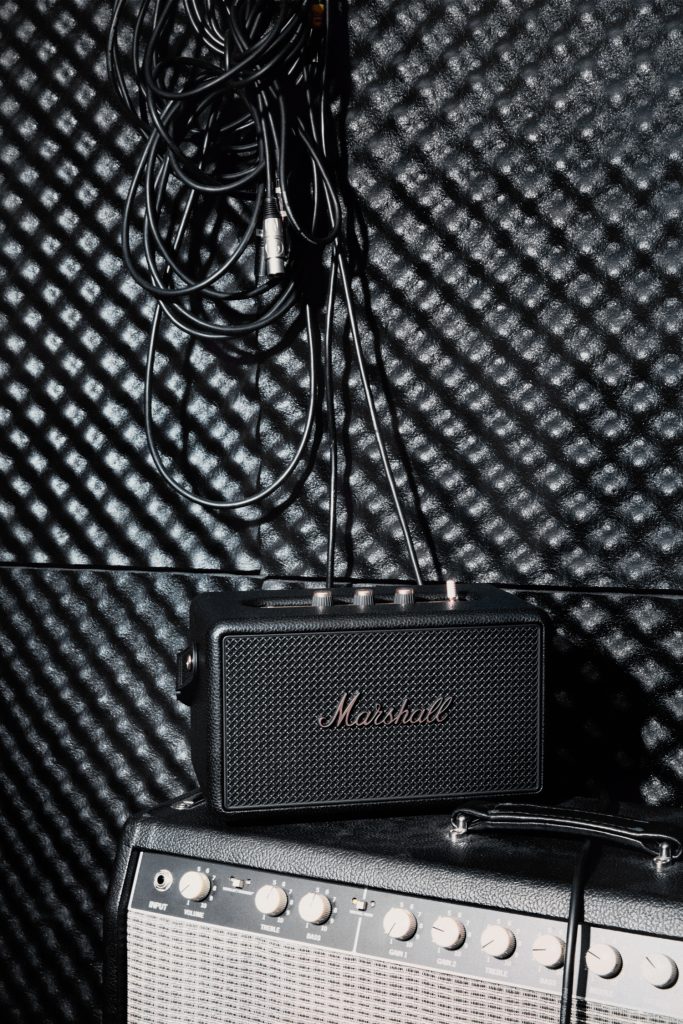
Hannah: Yeah, it’s exciting. Okay, one last question – is there anything you’ve enjoyed listening to, consuming, or doing lately?
Ove: What have I even done this week?
Hilda: I’m also trying to think hard…
Ove: You’ve been playing a lot.
Hilda: Yeah, right, there was this gig at Musikaliska Kvarteret. That was so much fun. It was like a mashup of all our friends and everything exciting happening in Stockholm right now. There were such great musicians – Civil Polis, but also Cockhouse Collective, Yikes, and Sonic Erection.
Emma: Shoutout to Yikes – I was so happy to see him play. It had been a while and it was amazing. I try to go every time Cockhouse plays, and that’s often. I feel a bit overwhelmed and I’m really looking forward to Midsummer – I just want to sit with a strawberry and have zero contact with the outside world.
Hannah: I have some bad news – apparently there’s a strawberry shortage this Midsummer.
Clutter: *Sounds of disappointment*.
Hannah: I know, I know. And on that note, thanks so much for the chat everyone. Bye, happy Midsummer!
Clutter: *Sounds of cheer and gratitude*.
| Writer | Hannah Wik |

